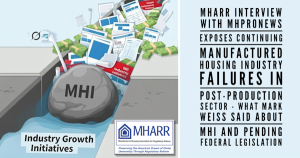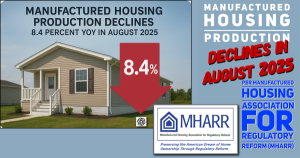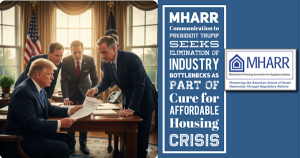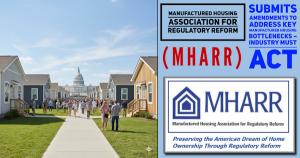MHARR Takes Major Step on Exclusionary Zoning In Meeting with Acting HUD Secretary Adrianne Todman
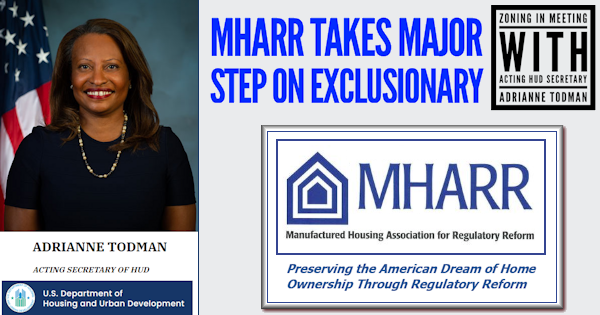
Washington, D.C., June 24, 2024 – In a meeting with HUD Acting Secretary Adrianne Todman on June 18, 2024, Manufactured Housing Association for Regulatory Reform (MHARR) President and CEO, Mark Weiss, called for decisive action by HUD to address and remove discriminatory zoning mandates which exclude affordable, mainstream HUD-regulated manufactured housing from many communities and is one of the principal drivers of housing unaffordability and unavailability in the United States. More precisely, discriminatory and exclusionary zoning are one of three major bottlenecks that have suppressed the long-term growth of the manufactured housing industry as well as the availability of mainstream HUD Code manufactured housing for all too many American consumers (the others being consumer financing discrimination by Fannie Mae and Freddie Mac and looming excessive federal energy regulation).
As published reports continue to reflect, the United States faces a severe and chronic shortage of affordable housing, which has reduced the United States’ rate of homeownership and housing affordability to their lowest levels ever. This extreme shortage, which corresponds with unprecedentedly low production numbers for HUD Code manufactured homes (which have fallen below 100,000 homes annually in 15 of the past 17 years) represents a catastrophe for lower and moderate-income families due, in substantial part, to zoning exclusion. As legal scholars have recently emphasized, “Exclusionary zoning severely reduces the housing supply in many jurisdictions, thereby preventing people from moving to areas where they could find better jobs and educational opportunities. It also increases homelessness by pricing poor residents out of the housing market. Exclusionary zoning causes enormous harm.” (Emphasis added).
MHARR was one of the principal proponents of the “enhanced” federal preemption of the Manufactured Housing Improvement Act of 2000 (2000 Reform Law), which gave HUD express authority to preempt any type of state or local “requirement” that interferes with federal (i.e., HUD) superintendence of the manufactured housing industry. In 2003, key congressional supporters of the 2000 Reform Law, including Rep. Barney Frank, Rep. Maxine Waters, and Rep. Bennie Thompson, in a letter to the then-HUD Secretary, made it clear beyond any debate that under the enhanced federal preemption of the 2000 Reform Law, localities cannot unfairly inhibit or prohibit development or placement of manufactured housing. As a result, MHARR has consistently urged HUD to exercise this statutory authority to prevent the discriminatory exclusion of affordable manufactured housing via zoning edicts and reiterated that position in urging bold action in support of manufactured housing and manufactured housing land-lease communities by the Acting Secretary.
Significantly, though, and as MHARR emphasized to the Acting Secretary, enhanced federal preemption under the 2000 Reform Law is just one of the multiple legal bases that HUD could, should and must assert to stop the discriminatory exclusion of affordable mainstream HUD-regulated manufactured housing — and the lower and moderate-income Americans who rely upon them – from far too many communities.
Specifically, and as MHARR has asserted for nearly a decade, HUD’s sweeping authority to Affirmatively Further Fair Housing (AFFH) under the federal Fair Housing Act, provides a separate and additional basis for the Department to invalidate discriminatory local zoning mandates which exclude affordable, mainstream manufactured housing and thereby extend or exacerbate racially disparate housing impacts. In various AFFH proposals issued over that same period, HUD has specifically claimed the authority to overturn zoning edicts that promote discriminatory impacts. MHARR, accordingly, in previously-filed regulatory comments and in its meeting with the Acting Secretary, continues to urge that HUD use the very same authority to override local zoning which discriminatorily excludes HUD-regulated manufactured housing and manufactured housing residents.
Beyond these statutory remedies, constitutional scholars have recently asserted that discriminatory zoning exclusion also constitutes a government “taking” of private property under the U.S. Constitution, which requires just compensation under the Fifth Amendment. Those authors have maintained that “because exclusionary zoning severely restricts property owners’ right to use their land … that … qualifies as … a taking and is unconstitutional unless the government pays compensation. Consistent enforcement of this interpretation would severely constrain exclusionary zoning….”
New HUD guidance and related enforcement action to prevent, to the maximum degree possible, the destructive zoning exclusion of inherently affordable, mainstream HUD Code manufactured homes, could rest on any one or all of these grounds, but is essential to removing one of the principal bottlenecks that has for far too long, suppressed the availability and utilization of such homes, in violation of applicable federal law.
In Washington, D.C., MHARR President/CEO Mark Weiss stated: “With discriminatory and exclusionary zoning causing untold harm to both the domestic manufactured housing industry and American consumers of affordable housing, HUD has, in its toolbox right now, three major bases that it can, should and must use to end this ongoing attack on homes that the Department itself comprehensively regulates and the American families that rely on them, while simultaneously addressing a major part of the housing crisis that currently grips the nation.”
The Manufactured Housing Association for Regulatory Reform is a Washington, D.C.- based national trade association representing the views and interests of independent producers of federally-regulated manufactured housing.
Washington, D.C., June 24, 2024 – In a meeting with HUD Acting Secretary Adrianne Todman on June 18, 2024, Manufactured Housing Association for Regulatory Reform (MHARR) President and CEO, Mark Weiss, called for decisive action by HUD to address and remove discriminatory zoning mandates which exclude affordable, mainstream HUD-regulated manufactured housing from many communities and is one of the principal drivers of housing unaffordability and unavailability in the United States. More precisely, discriminatory and exclusionary zoning are one of three major bottlenecks that have suppressed the long-term growth of the manufactured housing industry as well as the availability of mainstream HUD Code manufactured housing for all too many American consumers (the others being consumer financing discrimination by Fannie Mae and Freddie Mac and looming excessive federal energy regulation).
As published reports continue to reflect, the United States faces a severe and chronic shortage of affordable housing, which has reduced the United States’ rate of homeownership and housing affordability to their lowest levels ever. This extreme shortage, which corresponds with unprecedentedly low production numbers for HUD Code manufactured homes (which have fallen below 100,000 homes annually in 15 of the past 17 years) represents a catastrophe for lower and moderate-income families due, in substantial part, to zoning exclusion. As legal scholars have recently emphasized, “Exclusionary zoning severely reduces the housing supply in many jurisdictions, thereby preventing people from moving to areas where they could find better jobs and educational opportunities. It also increases homelessness by pricing poor residents out of the housing market. Exclusionary zoning causes enormous harm.” (Emphasis added).
MHARR was one of the principal proponents of the “enhanced” federal preemption of the Manufactured Housing Improvement Act of 2000 (2000 Reform Law), which gave HUD express authority to preempt any type of state or local “requirement” that interferes with federal (i.e., HUD) superintendence of the manufactured housing industry. In 2003, key congressional supporters of the 2000 Reform Law, including Rep. Barney Frank, Rep. Maxine Waters, and Rep. Bennie Thompson, in a letter to the then-HUD Secretary, made it clear beyond any debate that under the enhanced federal preemption of the 2000 Reform Law, localities cannot unfairly inhibit or prohibit development or placement of manufactured housing. As a result, MHARR has consistently urged HUD to exercise this statutory authority to prevent the discriminatory exclusion of affordable manufactured housing via zoning edicts and reiterated that position in urging bold action in support of manufactured housing and manufactured housing land-lease communities by the Acting Secretary.
Significantly, though, and as MHARR emphasized to the Acting Secretary, enhanced federal preemption under the 2000 Reform Law is just one of the multiple legal bases that HUD could, should and must assert to stop the discriminatory exclusion of affordable mainstream HUD-regulated manufactured housing — and the lower and moderate-income Americans who rely upon them – from far too many communities.
Specifically, and as MHARR has asserted for nearly a decade, HUD’s sweeping authority to Affirmatively Further Fair Housing (AFFH) under the federal Fair Housing Act, provides a separate and additional basis for the Department to invalidate discriminatory local zoning mandates which exclude affordable, mainstream manufactured housing and thereby extend or exacerbate racially disparate housing impacts. In various AFFH proposals issued over that same period, HUD has specifically claimed the authority to overturn zoning edicts that promote discriminatory impacts. MHARR, accordingly, in previously-filed regulatory comments and in its meeting with the Acting Secretary, continues to urge that HUD use the very same authority to override local zoning which discriminatorily excludes HUD-regulated manufactured housing and manufactured housing residents.
Beyond these statutory remedies, constitutional scholars have recently asserted that discriminatory zoning exclusion also constitutes a government “taking” of private property under the U.S. Constitution, which requires just compensation under the Fifth Amendment. Those authors have maintained that “because exclusionary zoning severely restricts property owners’ right to use their land … that … qualifies as … a taking and is unconstitutional unless the government pays compensation. Consistent enforcement of this interpretation would severely constrain exclusionary zoning….”
New HUD guidance and related enforcement action to prevent, to the maximum degree possible, the destructive zoning exclusion of inherently affordable, mainstream HUD Code manufactured homes, could rest on any one or all of these grounds, but is essential to removing one of the principal bottlenecks that has for far too long, suppressed the availability and utilization of such homes, in violation of applicable federal law.
In Washington, D.C., MHARR President/CEO Mark Weiss stated: “With discriminatory and exclusionary zoning causing untold harm to both the domestic manufactured housing industry and American consumers of affordable housing, HUD has, in its toolbox right now, three major bases that it can, should and must use to end this ongoing attack on homes that the Department itself comprehensively regulates and the American families that rely on them, while simultaneously addressing a major part of the housing crisis that currently grips the nation.”
The Manufactured Housing Association for Regulatory Reform is a Washington, D.C.- based national trade association representing the views and interests of independent producers of federally-regulated manufactured housing.

